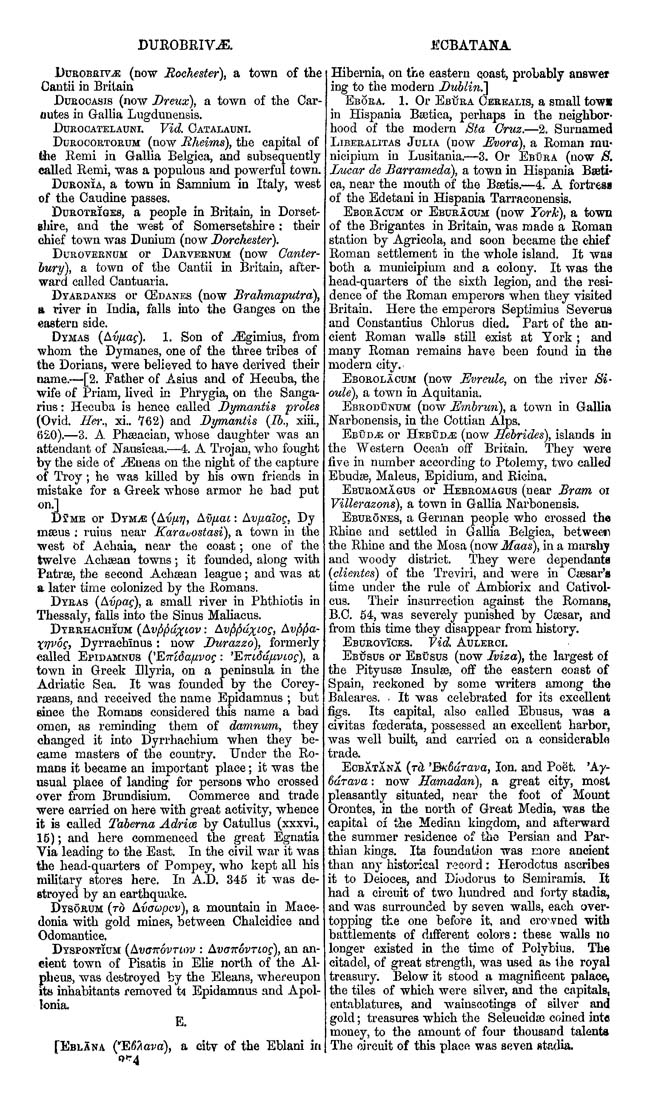DUROBRIVE.
ECBATANA
Durobrtv^e (now Rochester), a town of the
Cantii in Britain
DuROCAsrs (now Breux), a town of the Car-
flutes in Gallia Lugdunensis.
DUROCATELAUNT. Vid. OaTALAUNL
Durooortorum (now Rheims), the capital of
(he Remi in Gallia Belgica, and subsequently
called Remi, was a populous and powerful town.
Duronia, a town in Samnium in Italy, west
of the Caudine passes.
Durotriges, a people in Britain, in Dorset
shire, and the west of Somersetshire: their
chief town was Dunium (now Borchester).
Durovernum or Darvernum (now Canter¬
bury), a town of the Cantii in Britain, after¬
ward called Cantuaria.
Dyardanes or G5danes (now Brahmaputra),
a river in India, falls into the Ganges on the
eastern side.
Dymas (Avpag). 1. Son of Egimius, from
whom the Dymanes, one of the three tribes of
the Dorians, were believed to have derived their
name.—[2. Father of Asius and of Hecuba, the
wife of Priam, lived in Phrygia, on the Sanga-
rius: Hecuba is hence called Bymantis proles
(Ovid. Her, xi. 762) and Bymantis (lb, xiii,
620).—3. A Phaaacian, whose daughter was an
attendant of Nausicaa.—4. A Trojan, who fought
by the side of Eneas on the night of the capture
of Troy ; he was killed by his own friends in
mistake for a Greek whose armor he had put
on.]
Dyme or Dym.e (Avun, Avuai: Avualog, Dy
maeus : ruins near Karauostasi), a town in the
west Of Achaia, near the coast; one of the
twelve Achaean towns; it founded, along with
Patrae, the second Achaean league; and was at
a later time colonized by the Romans.
Dyras (Avpag), a small river in Phthiotis in
Thessaly, falls into the Sinus Maliaeus.
Dyrrhachium (Avppdxwv: Avp'p'dxiog, Avfifia-
Xnvog, Dyrraehinus: now Burazzo), formerly
called EprDAMNUS ('Eiridauvog: 'Embdfivwg), a
town in Greek Dlyria, on a peninsula in the
Adriatic Sea. It was founded by the Corcy-
raeans, and received the name Epidamnus ; but
since the Romans considered this name a bad
omen, as reminding them of damnum, they
changed it into Dyrrhachium when they be¬
came masters of the country. Under the Ro¬
mans it became an important place; it was the
usual place of landing for persons who crossed
over from Brundisium. Commerce and trade
were carried on here with great activity, whence
it is called Taberna Adrie by Catullus (xxxvi,
15); and here commenced the great Egnatia
Via leading to the East. In the civil war it was
the head-quarters of Pompey, who kept all his
military stores here. In A.D. 345 it was de¬
stroyed by an earthquake.
Dysorum (to Avoapcv), a mountain in Mace¬
donia with gold mines, between Chaleidiee and
Odomantice.
Dyspontium (Avckovtwv : Avairbvriog), an an¬
cient town of Pisatis in Elie north of the Al¬
pheus, was destroyed by the Eleans, whereupon
its inhabitants removed ti Epidamnus and Apol¬
lonia.
E.
[Eblana ("EBXava), a citv of the Eblani in
0T4
Hibernia, on the eastern coast, probably answer
ing to the modern Bublin.~\
Ebora. 1. Or Ebura Cerealis, a small tows
in Hispania Baetica, perhaps in the neighbor¬
hood of the modern Sta Cruz.—2. Surnamed
Liberalitas Julia (uow Evora), a Roman mu¬
nicipium in Lusitania.—3. Or Ebura (now S.
Lucar de Barrameda), a town in Hispania Baeti¬
ca, near the mouth of the Baetis.—4. A fortress
of the Edetani in Hispania Tarraconensis.
Eboracum or Eburaoum (now York), a town
of the Brigantes in Britain, was made a Roman
station by Agricola, and soon became the chief
Roman settlement in the whole island. It was
both a municipium and a colony. It was the
head-quarters of the sixth legion, and the resi¬
dence of the Roman emperors when they visited
Britain. Here the emperors Septimius Severus
and Constantius Chlorus died. Part of the an¬
cient Roman walls still exist at York ; and
many Roman remains have been found in the
modern city.
Eborolacum (now Evreule, on the river Si-
oule), a town in Aquitania.
Ebrodunum (now Embrun), a town in Gallia
Narbonensis, in the Cottian Alps.
EbCd-e or Hebud-e (now Hebrides), islands in
the Western Ocean off Britain. They were
five in number according to Ptolemy, two called
Ebudae, Maleus, Epidium, and Ricina.
Eburomagus or Hebromagus (near Brum or
Villerazons), a town in Gallia Narbonensis.
Eburones, a German people who crossed the
Rhine and settled in Gallia Belgica, between
the Rhine and the Mosa (now Maas), in a marshy
and woody district. They were dependants
(clientes) of the Treviri, and were in Caesar's
time under the rule of Ambiorix and Cativol-
eus. Their insurrection against the Romans,
B.C 54, was severely punished by Caesar, and
from this time they disappear from history.
EburovIces. Vid. Aulerci.
Ebusus or Ebusus (now Iviza), the largest of
the Pity usee Insulaa, off the eastern coast of
Spain, reckoned by some writers among the
Baleares. . It was celebrated for its excellent
figs. Its capital, also called Ebusus, was a
civitas fcederata, possessed an excellent harbor,
was well built, and carried on a considerable
trade.
Ecbatana (rd 'Ev.Bdrava, Ion. and Poet. 'Ay-
Bdrava: now Hamadan), a great city, most
pleasantly situated, near the foot of Mount
Orontes, in the north of Great Media, was the
capital oi the Median kingdom, and afterward
the summer residence of the Persian and Par¬
thian kings. Its foundation was more ancient
than any historical record: Herodotus ascribes
it to Deioces, and Diodorus to Semiramis. It
had a circuit of two hundred and forty stadia,
and was surrounded by seven walls, each over¬
topping the one before it, and crowned with
battlements of drfferent colors: these walls no
longer existed in the time of Polybius. The
citadel, of great strength, was used as the royal
treasury. Below it stood a magnificent palace,
the tiles of whieh were silver, and the capitals,
entablatures, and wainscotings of silver and
gold; treasures which the Seleueidaa coined into
money, to the amount of four thousand talents
The circuit of this place was seven stadia.
|








